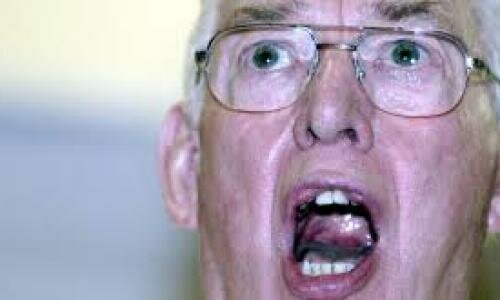
The Odd Couple: Labour man tells how he prayed with Ian Paisley
Former West Midlands Labour MEP David Hallam, a Methodist preacher, struck up an unlikely friendship with the Rev Ian Paisley when both were at Brussels. Here, Hallam recounts what it was like ‘praying with Paisley’.
In death the Reverend Ian Paisley is lauded as a peacemaker. But in the 1990s it was unheard of for a Labour politician, and a Methodist to boot, to meet and pray with him. Ian Paisley was seen as a dangerous extremist, well beyond the pale of mainstream British politics.
After my election to the European Parliament in 1994 I was asked to lead the monthly prayer breakfast. I noted that the Parliament’s most prominent cleric, Ian Paisley, did not meet with us.
I introduced myself and invited him to join us at future Prayer Breakfasts. “Come for lunch” was his immediate reply. As I sat with him in the members’ dining room I looked over my shoulder just wondering what my new colleagues would make of my breaking bread with the biggest pariah in British politics.
The first few minutes were difficult. He made the point that a lot of people from the mainland talked about Northern Ireland without knowing much about the province.
I told him that twenty years before I had worked on a church play scheme based on the Protestant Shankhill Road and the Catholic Ardoyne districts of Belfast. It was at the height of “The Troubles”, another play leader had been shot dead and I was badly beaten.
He said he was appreciative of such cross community initiatives which tried to bring both Catholic and Protestant children together. I began to realise that he wasn’t quite the bigot of popular mythology.
He wouldn’t join the prayer breakfast because it was ecumenical, but we set up a regular series of meetings each month on Wednesdays in Strasbourg. Only my staff and very closest friends knew of this arrangement. Had it been widely known it would have posed serious political, and even physical, risks.
Over the five year period we must have met at least thirty times. We mainly discussed religion. His knowledge of the Bible was awesome and I learnt a lot. We disagreed occasionally. He described my views on infant baptism as “bigoted” followed by a chuckle, he taking a more “liberal” position.
He was helpful in other ways too. He knew the intricacies of the EU’s common agricultural policy and gave me some sound advice to help my farmers as they reeled from the BSE crisis.
This period was during the early stages of the peace process. I argued with him that sooner or later he would have to sit down with Gerry Adams, then the most prominent Sinn Fein leader. He was quite adamant this could only happen when Sinn Fein entirely repudiated, even “repented” of, violence.
Our meetings always ended with prayers. Here I found a man entirely different from his public persona. He prayed with a passionate and loving tone for those we had mentioned in the previous 45 minutes: for example my children, his constituents, Gerry Adams, John Hume, the Dalai Lama, John Major, and Tony Blair. We prayed for peace in Northern Ireland and the process that would deliver it.
Our friendship was tested during Ulster’s marching season of 1996. The Orangemen, including Ian, marched each year through a predominantly Catholic village to a church at Drumcree. Over successive years the violence around this event had got worse. Serious disorder around Drumree would have caused the peace talks chaired by US Senator George Mitchell to collapse. Across Britain and Ireland we held our collective breath.
An MEP, from a Dutch Protestant Party, came to see me and asked if I would speak with Ian as the crisis was reflecting badly on his party at home. The timetable meant that the only way I could speak to Ian was to go to Belfast. My office manager spoke directly to him and booked my flights for the following day.
Before I left I rang her from Birmingham airport. She told me how the previous day she had a very civilised and polite conversation with Ian Paisley and thought what a nice man he was. At home though, she had turned on the TV news to see and hear him shouting into the camera with his face contorted by hatred and rage. There seemed to be two Ian Paisleys.
When I met Ian at Stormont I related this story to him. His face changed and it was the first time I had ever seen him look vulnerable. We talked about Drumcree and the wider peace process.
Eventually we went into the empty room where the talks were due to take place. We prayed and then sang together the short chorus “He is Lord”. The following day a compromise was brokered. There was considerably less violence than had been anticipated. The peace talks were resumed. Ian Paisley eventually sat down with Gerry Adams.
Praying with Paisley was a risk but a remarkable experience.
*This article has also appeared in the Methodist Recorder .
Similar Articles
PM: gave unlawful advice; frustrated Parliament
"Scenes." As young people would say, writes Kevin Johnson. "Unlawful." "Unequivocal." "Historical." These words are not,
WMCA: Nothing to see here…move along
As the Prime Minister prepared to address leaders ‘up North’ gathering for the Convention of
HS2: new driver needed
Is the Oakervee Review "welcome", "frustrating" or the end of the line for HS2, asks
Dawn goes Down Under
It might appear that Birmingham city council changes its chief executives more regularly than its
Hezza: Give Metro Mayors greater powers to deliver housing, skills and jobs
Britain’s metro mayors should be given greater powers over housing, schools and jobs to truly










